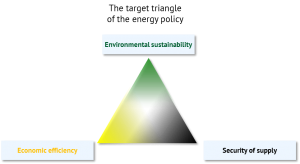In the anticipated legislative period, there is a great need of energy policy to respond to changes in the realms of energy, mobility and digitisation and to attain the objectives set. After evaluating the election programmes of CDU/CSU, FDP and Alliance 90/The Greens, Energy Brainpool has identified five relevant challenges that could provide a solid basis for a common energy policy.

These are climate protection, sector coupling / energy storage, the distribution of costs among consumer groups, digitisation and European internal market integration. Regarding this purpose from an independent point of view Energy Brainpool formulates five theses as a basis for discussion:
Five theses for the design of the energy market
- The implementation of the climate protection targets succeed through an effective CO2 price which is designed as European and cross- sectoral as possible.
- A level-playing field in the coupled sectors of heat, mobility and electricity ensures that scarcity or surplus situations in the energy markets are hardly created by the increasing flexibility of the overall system.
- Currently, the costs of charges, levies and taxes, which depend on the energy source and consumer group, are unevenly distributed. This is the essential obstacle to a holistic approach to the energy market.
- The digitisation is imperative for the decarbonisation and decentralisation of the energy sector. The high efficiency gains are the engine of this process. Above all, it is essential that the regulation must keep pace.
- It is crucial to solve the challenges of security of supply, environmental compatibility and economic efficiency on a European scale.
The five theses in detail
- The implementation of the climate protection targets succeed through an effective CO2 price which is designed as European and cross- sectoral as possible.
All four parties are committed to the climate protection goals of Paris and more Europe. The legislator must appropriately price CO2 emissions. An agreement on this can be reached together with France and other countries in a network of European pioneers.
This is essential to actually avoid emissions rather than just relocating them. A higher carbon price of about 30 EUR/t strengthens the competitiveness of low-emission and zero-emission technologies across Europe.. The market is conducting the switch from coal to gas in such an efficient manner at the national level as well.This reduces the need to limit installations of remunerate wind and photovoltaic. Furthermore, more market means less promotion. A sinking EEG tariff relieves consumers and reduces the “price tag” of the energy transition. - A level-playing field in the coupled sectors of heat, mobility and electricity ensures that scarcity or surplus situations in the energy markets are hardly created by the increasing flexibility of the overall system.
There is a broad consensus that sector coupling has great potential for the economy and the environment. The new federal government can make Germany to a pioneer in global change. This leads away the general demand-driven burning of fossil fuels towards the optimal use of the offer of renewable energies. The best possible technology mix of electro mobility, renewable fuels, Power-to-X, storage and load management can be found in competition. However, to make optimum use of available energy, all technologies must be subject to the same conditions, regardless of the energy sources (gas, electricity, district heating and liquid fuels) and use. - Currently, the costs of charges, levies and taxes, which depend on the energy source and consumer group, are unevenly distributed. This is the essential obstacle to a holistic approach to the energy market.
Energy supply enterprises have the innovative strength to offer their customers ecologically and economically optimised solutions for energy services in the areas of heat, electricity and transport. At the moment, there is an incentive to avoid network charges, taxes and levies or to be liberated of it. In particular, the electrification and flexibilisation of the energy markets is currently hampered by high, fixed, non-influenceable electricity price components. The regional differences in network charges are weakening business locations. The proposals for the renovation are on the table. The new government has the urgent task of defining decision-making criteria with all stakeholders and additionally selecting and implementing a future proof concept. - The digitalisation is imperative for the decarbonisation and decentralisation of the energy sector. The high efficiency gains are the engine of this process. Above all, it is essential that the regulation must keep pace.
The digitisation is urgently required in an ever smaller and more interactive energy market. At the same time, it presses as a global trend in the market and creates new business models with unique technologies. Therefore, artificial intelligence, autonomous driving, Blockchain and smart meters are given examples which can become necessary components of rewarding business models. In terms of changes or disruptive upheavals, regulation must assess regulatory obstacles and if required eliminate them. Besides, a major task will be to accompany the developments with the glasses of a risk manager, for example, to ensure the security of supply and to avoid social upheaval. In addition, the interests of citizens regarding the terms of data protection must be well represented. - It is crucial to solve the challenges of security of supply, environmental compatibility and economic efficiency on a European scale.
If the approaches are more European, the more efficiently and effectively the goals are achieved in the target triangle of energy policy. In terms of environmental compatibility, a national climate protection with relocations of emissions has merely a symbolic value abroad. The more rapid the European internal market integration progresses, the lower the economic costs for power generation. Nevertheless sinking electricity prices are in everyone’s interest. In the past winter, France was able to rely on the European concept of European security of supply for failed nuclear power plants. Regarding the cold dark doldrums of the future, each market area will need support. Europe-wide energy policy solutions strengthen the EU and integrate furthermore non-EU members.
In these five topics, Energy Brainpool sees great need for action as well as sustainable solutions for energy policy in a Jamaican coalition. The ambitions are definitely driven of consensus. Nevertheless, flexibility and openness of all involved parties in finding their way, the given coalition option offers a great opportunity. The popularity of emission- free technologies have become the cost leader in recent years and ready to be launched. Therefore you can increase the quality of life, promote the middle class and the home industry. Meanwhile it is possible to diminish subsidies and secure the supply.
Authors of the article: Fabian Huneke, Carlos Perez Linkenheil, Tobias Kurth



